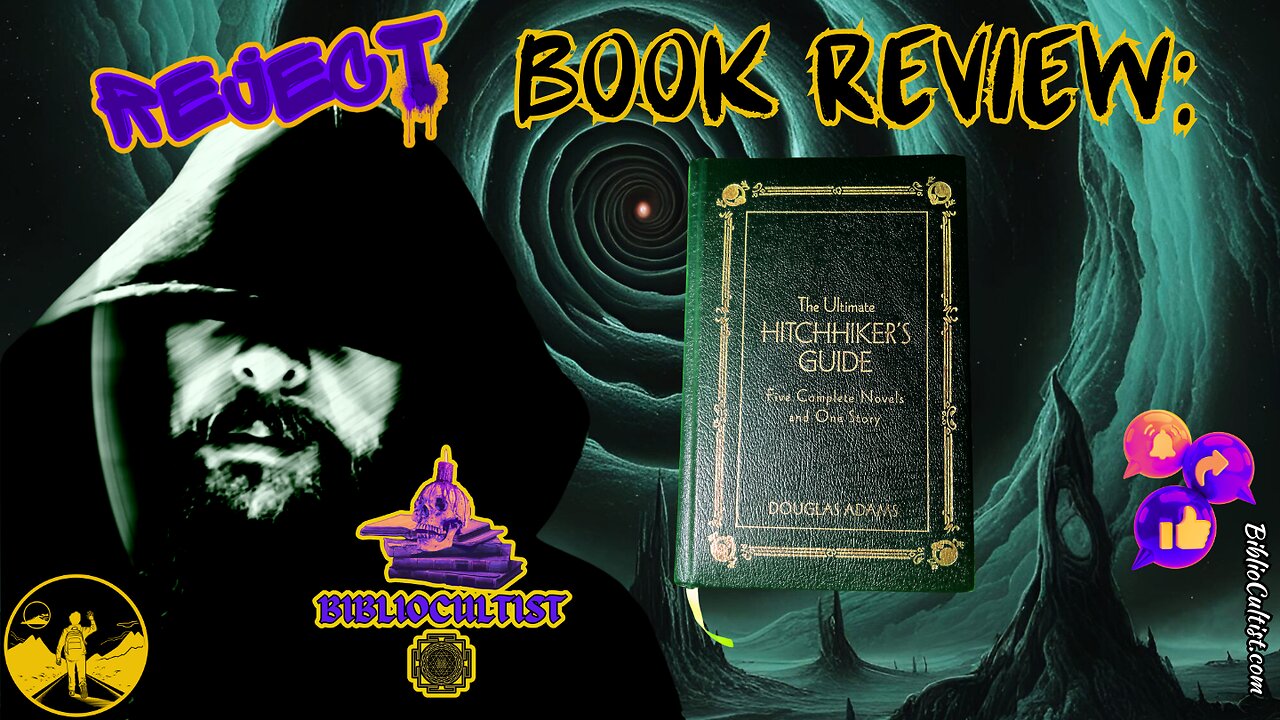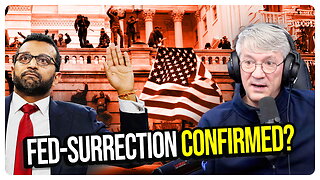Premium Only Content

The Hitchhiker's Paradox: When Cosmic Absurdity Swallows the Search for Meaning
*SHOW NOTES BELOW THE DESCRIPTION*
In this 'spoiler free' #REJECT #bookreview, I explore Douglas Adams' iconic 'The Hitchhiker's Guide to the Galaxy' series. While appreciating its satirical take on bureaucracy and consumerism, I found the novels too absurd and comedic to fully engage with the existential themes. The story follows characters escaping Earth before its demolition by aliens, with initially entertaining plots and characters. However, the comedic structure undercut the theological propositions, making them difficult to take seriously. I enjoyed the critique of modern culture replacing actual meaning but felt the genius of the original radio show was lost in the novel adaptations. Despite wanting to like this classic work, the over-the-top ridiculousness prevented me from fully enjoying it.
*all music and content copyright BiblioCultist.com*
#booktube #books #DouglasAdams #TheHitchhikersGuideToTheGalaxy #scifi #comedy #satire #bureaucracy #consumerism #existentialism #radioshow #novels #biblio #cultist #cult
**SHOW NOTES**
1. **Douglas Adams** (1952–2001) was a literary alchemist who transmuted the mundane into the cosmic, crafting *The Hitchhiker's Guide to the Galaxy* as both a satire of modern folly and a mirror to humanity’s place in an indifferent universe. With an architect’s precision for absurdity, he wove tales that balanced the trivial with the eternal—his characters adrift in a cosmos vast, irrational, and often ridiculous, yet eerily resonant with hidden truths.
2. Bureaucracy, born of the French *bureau* (“desk”) and the Greek *krátos* (“power”), represents the ascendancy of structure over spirit—a rigid, impersonal machinery wherein humanity is reduced to cogs in a vast, unfeeling apparatus. It is a labyrinth without end, a manifestation of abstract order that stifles life beneath layers of protocol and formality. Its essence lies not in governance but in the suffocating weight of empty ritual, where meaning is lost to the ceaseless grind of procedure.
3. The term *cult* originally denoted reverence or devotion, rooted in the Latin *cultus*, meaning “care” or “worship.” It referred to practices of veneration, often tied to spiritual or communal traditions, without inherent moral judgment. However, modern usage has skewed its perception, associating it with secrecy, manipulation, or extremism. In truth, a cult can simply signify a group bound by shared ideals or rituals, existing beyond the shadow of negativity. Its essence lies in the eye of the beholder, as what appears esoteric or unconventional may merely reflect the mysteries of belief and the human search for meaning.
4. Eschatology, the study of ultimate ends, delves into the profound mysteries of existence—whether through the lens of cosmic dissolution, spiritual transcendence, or societal collapse. It peers beyond the veil of temporal order, contemplating what lies at the horizon of time’s great unfolding. Far from mere prophecy or doom-laden predictions, eschatology examines the architecture of finality itself, revealing humanity's enduring fascination with thresholds and transformations. It whispers of an eternal rhythm, where endings are not merely cessations but gateways to unseen beginnings.
5. Solipsism is the philosophical stance that one’s own mind is the only certainty, and all external realities—other minds, the world, even existence itself—are unknowable or potentially illusory. It reflects an abyssal introspection, where the self becomes both prisoner and sovereign of its perceptions, trapped in a labyrinth of subjective experience. This notion, while intellectually provocative, unravels the fabric of shared reality, leaving only the solitary thinker adrift in a sea of doubt and infinite regress.
6. Certain works of art, particularly books, have been crafted with the intention of being experienced through the lens of altered consciousness, where intoxication becomes a key to their hidden chambers. These texts often embrace ambiguity, nonlinear narratives, and symbolic density, inviting the reader to transcend rational constraints and plunge into realms of heightened perception. Such works blur the boundaries between creator and interpreter, offering an unfiltered communion with the esoteric and the surreal. They demand not sobriety but surrender—a dissolution of the self into the fluid interplay of words, images, and meanings that shimmer just beyond the reach of reason.
-

The Nick DiPaolo Show Channel
3 hours agoKirk Assassination Theories Abound! | The Nick Di Paolo Show #1795
8.37K6 -
 41:09
41:09
Katie Miller Pod
16 hours agoEpisode 8 - Adena Friedman | The Katie Miller Podcast
4.2K -
 LIVE
LIVE
Nikko Ortiz
1 hour agoArena Breakout Better Than Tarkov? - Rumble LIVE
104 watching -
 LIVE
LIVE
GritsGG
5 hours agoDuos! Most Wins in WORLD! 3680+!
125 watching -
 DVR
DVR
Kim Iversen
2 hours agoSnake Eyes to Charlie Kirk: Is Life Copying this Hollywood Script?
19.1K29 -
 1:05:24
1:05:24
TheCrucible
2 hours agoThe Extravaganza! EP: 44 (9/29/25)
86.5K6 -
 1:39:07
1:39:07
Redacted News
3 hours agoThe FBI's Charlie Kirk assassination story has fully collapsed as new details emerge | Redacted News
139K122 -
 1:15:20
1:15:20
vivafrei
5 hours agoLive with The Blaze's Steve Baker: Jan. 6 Fed-Surrection and Patel's Clarification Adds Confusion!
162K39 -
 LIVE
LIVE
Futures Edge: Finance Unfiltered with Jim Iuorio and Bob Iaccino
4 hours ago $1.34 earnedSeptember Surge: What It Means for Q4
79 watching -
 1:41:57
1:41:57
The Quartering
5 hours agoMotive In Church Attack Revealed, Dangerous Walmart Food Kills, Eric Adams Out & More
167K42